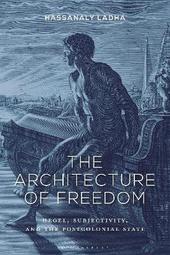
|
The Architecture of Freedom: Hegel, Subjectivity, and the Postcolonial State
Hardback
Main Details
Description
Through a radical reading of Hegel's oeuvre, The Architecture of Freedom sets forth a theory of open borders centered on a new interpretation of the German philosopher's related conceptions of language and the aesthetic, mastery and servitude, and subjectivity and the state. The book's argument turns on Hegel's identification of "Africa" as a fluid, utopic space enabling the traversal of the East-West binary. As Hegel's figure for the non-historical, Africa emerges as the negativity that propels the movement of the dialectic in time. Mirroring the "shrouded" continent's relation to history, Kantian "architectonics" step out of the realm of logic in Hegelian thought and drive the historical unfolding of the aesthetic. In a foundational move, Hegel hypostatizes the aesthetic entanglement of built and linguistic form as the colossus of Memnon, an African warrior memorialized in ancient architecture, myth, and art. Reaching for freedom, the Memnon marks the architectonic modality through which the African slave, at the telos of history, will fulfill the spiritual promise of the human and bring about the politically mature state. The book examines the syncretic figure of the Memnon and slave across Hegel's lecture courses, the Phenomenology of Spirit, the Encyclopedia, and the Philosophy of Right. Ultimately the book calls for a reassessment of a range of Hegelian philosophemes across disciplines in the humanities. This book will be of particular interest to scholars in philosophy, postcolonial and African studies, political theory, architecture, and historiography.
Author Biography
Hassanaly Ladha is Associate Professor in Literatures, Cultures, and Languages at the University of Connecticut, USA.
ReviewsLadha brilliantly demonstrates that the central role of aesthetics in Hegel's political philosophy extends to his concepts of freedom and subjectivity, allowing for a new reading of the master-slave dialectic and of 'Africa' itself. The book offers crucial new developments that should radically influence all debates on slavery and Africa at the time of the Enlightenment, as well as post-colonial investigations. * Marie-Helene Huet, M. Taylor Pyne Emerita Professor of French, Princeton University, USA * Ladha's richly-detailed and wide-ranging book offers an important new perspective on Hegel, exploring with a fresh eye the relevance of his philosophy for current discussions of race, art, language, history, and politics. * Allen Speight, Chair of Philosophy, Boston University, USA * Ladha pursues Hegel's architectonic from aesthetic trace to international border, positing the centrality of slavery to his philosophy and reframing him as an exemplary thinker for the postcolonial present and future. * Emilio Spadola, Director, Program in Middle East and Islamic Studies, Colgate University, USA * Ladha's magisterial Architecture works its brilliant way through the entire Hegelian corpus, providing our first full analysis of the architectonic through-line of dialectical thought. Retracing the aesthetic origin of freedom from the hieroglyph-laden pyramid to the 'hieroglyph of reason' always imperfectly realized in the 'architectonic' 'artwork' of the particular 'state,' Architecture is a magnificent, pathbreaking work. * Claudia Brodsky, Professor of Comparative Literature, Princeton University, USA *
|